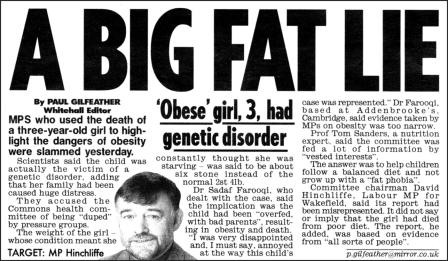The House of Commons Select Committee's inquiry on obesity was published on 27 May. The press release, issued the previous day but embargoed till publication of the report, highlighted the rapidly rising rates of obesity, the potential health consequences, and the need to increase physical activity and focus on preventing obesity in children. However, Radio 4's Today programme on 26 May had been leaked a story that MPs would report the case of an obese child who died of heart failure. By the evening, the media was saying that the report was critical of both the government and the food industry, and called for the banning of food advertising aimed at children. The following morning, national newspapers carried headlines like “Obesity kills child of 3.”
The report was officially available to the press for the first time on 27 May. Its second paragraph leaps out at the reader: “Over the last two years, [Dr Sheila McKenzie] had witnessed a child of three dying from heart failure where extreme obesity was a contributory factor. Four of the children in the care of her unit were being managed at home with non-invasive ventilatory assistance for sleep apnoea: as she put it, `in other words, they are choking on their own fat.'” When questioned at the press conference, David Hinchliffe, chairman of the committee, said: “We were all shocked when we heard about the young girl. I see in my constituency children who are grossly obese, but to hear of a girl dying from heart failure was shocking.” He added: “It was the first situation of its kind we had come across, but we feel it may become a more serious consequence of obesity in the future.”
Figure 1.
Daily Mirror, 10 June 2004
The evening papers ran the headlines “Choking our children on their fat” and “Food will carry fat warning.” It was not long before journalists had tracked down the parents of the dead child in the Bangladeshi community in east London. One commentator remarked, “When a three year old girl who weighs 40 kilograms dies of heart failure brought on by obesity, you know her parents are guilty of gross child abuse.”
There was a further flurry of media activity over the weekend, but by Tuesday there had been no corrections made by the select committee, who seemed pleased with the wide press coverage of the report. Investigative journalists became suspicious and, having talked to several experts, were told that it was very unlikely that such a young child would die from overeating unless there was some serious genetic defect such as leptin deficiency or Prader-Willi syndrome. It then emerged that a research group at Cambridge that specialises in the molecular genetics of precocious obesity had identified a serious genetic defect in the child, but the child had died before treatment could be offered. The story broke on the web (www.spiked-online.com) on 8 June and was more widely reported on the Today programme, which had been investigating the story for over a week, on 10 May.
Figure 2.

David Hinchliffe was incandescent on radio and television over the allegation that his committee had been duped: he denied that the committee intended to highlight the death of the child and blamed the press for misreporting her death. The following day the headlines ran that the committee had got it wrong on the death of the 3 year old and was guilty of telling a “Big Fat Lie.”
What lessons can be learnt from this episode? Much of the problem stems from the overheated language used in the report, which seems to have been intentionally placed to garner headlines. Secondly, it was quite inappropriate to link severe precocious obesity to the problem of overweight and moderate obesity in children, which is related to lifestyle. Thirdly, it was unwise and unethical to refer to a child with such a rare condition in a public report, as it is hard to protect the anonymity of the family. According to one of the committee's defenders, the National Obesity Forum (which is funded by the pharmaceutical industry), the girl's story “was used to gain a bit of drama and it certainly worked, but in retrospect it should probably not have been used.” The online publication spiked summed it up: “In this kind of climate it is not surprising that an isolated death can be turned into a modern morality tale, and that even bereaved parents, about whom we know nothing, can be accused of effectively killing their child.”



